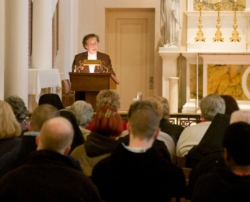Carmelite presentation explains importance of silence
ROXBURY -- Psalm 46 tells us “Be still and know that I am God.”
In our modern society, people are bombarded with the constant noise of television, cell phones and iPods that drowns out silence essential for fostering holiness, asserted Susan Muto in her paper presented Nov. 16 at the Carmelite Monastery in Roxbury. Muto is an author and executive director of the Epiphany Association, a nonprofit ecumenical center dedicated to spiritual formation.
“Silence is not to be shunned as empty space. It is to be befriended as fertile ground for intimacy with God. Noise has the opposite effect. It tends to fragment us,” she wrote in her paper entitled “The Relevance of the Rule of Carmel on Silence in a Noisy World.”
The work was presented by Sister Vilma Seelaus of the Carmelite Monastery in Barrington, R.I. Muto, a Catholic, holds a doctorate in English literature from the University of Pittsburgh, where she specialized in the work of post-Reformation spiritual writers, was unable to present the paper personally due to a family emergency.
Muto’s paper continued, saying that rather than being a luxury reserved for monks or mountaintops, silence is a survival measure in a noise-polluted world. It allows people of faith to be centered in God, standing on the firm ground of his unchanging love.
The Rule of Carmel, written by St. Albert of Jerusalem and confirmed by Pope Innocent IV in 1247, requires silence of Carmelites from after evening prayer to lauds the next morning.
Though Carmelites need not observe silence as strictly at other times, St. Albert advises them not to indulge “in a great deal of talk.” Instead, silence should be a “sweet fragrance” that seeps through the walls of the Carmel and purifies the outside air.”
“As Scripture has it, and experience teaches no less, sin will not be wanting where there is much talk,” he wrote.
Avoiding gossip is just as important in the office as it is in the monastery, Muto asserted.
“Working in silence produces positive, productive results,” she said.
Christians are called to restrain their speech, to say what they mean and to mean what they say. They need to understand that their words can affect others around them and even their spiritual community. When they curse others, they are cursing people made in the image and likeness of the Lord, Muto said.
Words can mock, abuse the weak, and inflict pain on others by pointing out their faults. They can also be scathing, vengeful remarks that strip a person of dignity or proud words that make the poor feel forgotten by God, she said.
Spending time in silence allows people to collect their thoughts and keeps them from rash words, she said.
“Everyone needs silence,” she said. “To neglect this need is to risk living a tense, fragmented, spiritless life. If we do not nourish our souls, they atrophy as does a body without food. To maintain any kind of Christ-like presence in the world, we need to seek silence and its fruits.”
Spiritual reading, meditation, prayer and contemplation are aided by silence and give the faithful the opportunity to encounter their Creator, she said.
“The encounter between the soul and God ultimately transcends what language can contain. In many ways, such intimacy is unspeakable. It is beyond words.”
Muto finished by quoting St. John of the Cross who said, “The Father spoke one Word, which was his Son, and this Word he speaks always in eternal silence, and in silence must it be heard by the soul.”
Sister Vilma, who has lived the Rule of Carmel for over 50 years, gave her reflections and answered audience questions after reading Muto’s paper. Sister Vilma recently published a book entitled “Distractions in Prayer: Blessings or a Curse?”
“I’m not sure if such a presentation leads itself to questions or to mindfulness meditation,” she began.
Sister Vilma said that St. Theresa of Avila affirmed that God is always present, even “in the pots and pans.” It takes practice to learn to feel his presence around us, she added.
Sister Claire Thornton, a Sister of the Holy Cross, said the talk emphasized the importance of silence in a world cluttered with noise.
“When I sit on the subway and I see people with their cell phones and their iPods on, it seems to me that as a culture we’re having an increasingly difficult time being still,” she said.
Young people are creating their own worlds, she added.
Evelyn Morrissey, parishioner at St. John the Baptist Parish in Quincy, agreed, adding that it can be easy to feel invisible to others on public transportation.
Morrissey said she has been the recipient of harsh words and hopes that more people will learn to reflect before they speak. She finds it necessary to at times remain silent and stay in God’s presence in order to not react rashly.



















